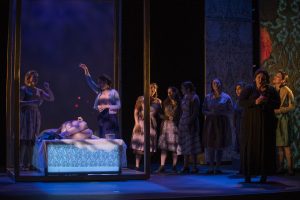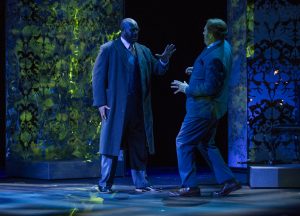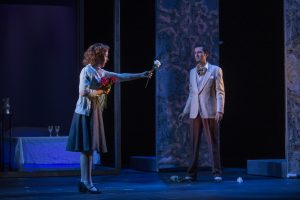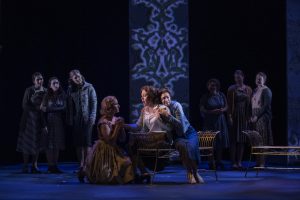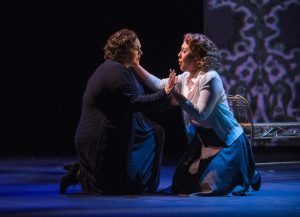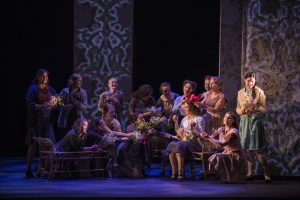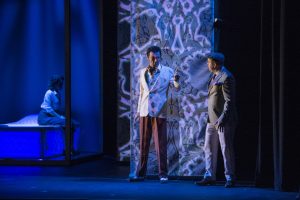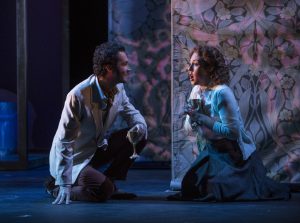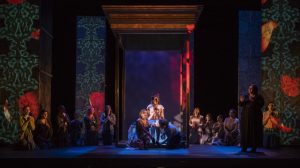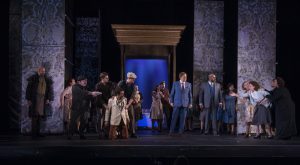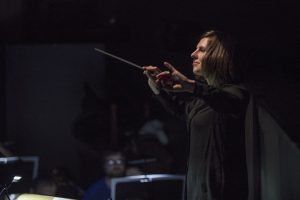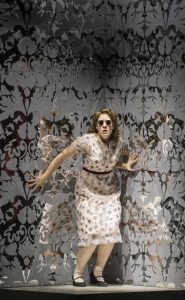HOT IOLANTA,
OR LOVE REALLY IS BLIND
A glorious 126-year-old discovery just happened again. First performed at Saint Petersburg’s Mariinsky Theater in 1892 (on a double-bill with The Nutcracker), the one-act Iolanta is the last of eleven operas written by the great Peter Ilyich Tchaikovsky. Running for only one more weekend, this 85-minute Slavic gem, performed in Russian with English supertitles, is impeccably restored for Chicago Opera Theater by stage director Paul Curran and noted conductor and C.O.T. music director Lidiya Yankovskaya. Gracing Chicago’s Art Moderne-style Studebaker Theater, Iolanta is a gift to anyone who hears it.
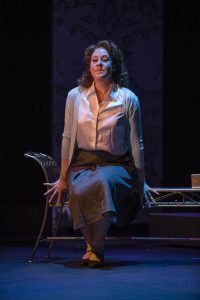 Based on a Danish play that confers fairy-tale make-believe on the life of medieval duchess Yolande de Bar (here altered to “Iolanta”), the libretto was written by the composer’s brother Modest (who was also gay). Steeped in fin de siècle romanticism, this parable/love story spins an enchanting but tersely tight tale that recounts the fanciful fate of a blind princess who must discover a wondrous world shrouded from birth.
Based on a Danish play that confers fairy-tale make-believe on the life of medieval duchess Yolande de Bar (here altered to “Iolanta”), the libretto was written by the composer’s brother Modest (who was also gay). Steeped in fin de siècle romanticism, this parable/love story spins an enchanting but tersely tight tale that recounts the fanciful fate of a blind princess who must discover a wondrous world shrouded from birth.
Overly protected by her father King René (magisterial Mikhail Svetlov), Iolanta (lovely and lyrical Katherine Weber) is forbidden to know that she is either blind or royal. The sovereign has confined his daughter to a secret garden where her ladies in waiting (given an enthrallingly lyrical chorus) delight and distract Iolanta with offerings of spring flowers. It’s not just that Iolanta cannot see: She doesn’t know that she is meant to see. For her, the only purpose for eyes is to make tears.
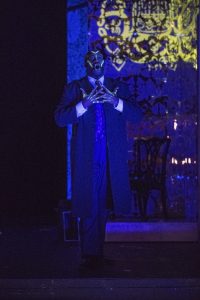 But what you don’t know can harm you. And love, as it must, will find a way — as will medicine. Iolanta’s desperate dad employs the famous Moorish physician Ibn-Hakia (Bill McMurray) to make Iolanta see. But this “seer” stipulates that the young lady must want the gift of vision: Her cure must be the courage to change her life by accepting sight. Only the most compelling cause will work that wonder.
But what you don’t know can harm you. And love, as it must, will find a way — as will medicine. Iolanta’s desperate dad employs the famous Moorish physician Ibn-Hakia (Bill McMurray) to make Iolanta see. But this “seer” stipulates that the young lady must want the gift of vision: Her cure must be the courage to change her life by accepting sight. Only the most compelling cause will work that wonder.
King René remains afraid that learning of her blindness will plunge his daughter into even deeper darkness. Hope can’t happen if it’s only to be crushed. Complicating matters is the fateful arrival of Duke Robert (Christopher Magiera), betrothed to Iolanta since birth. Alas, Robert, now rapturously in love with the unseen maiden Matilda, wants to cancel the engagement.
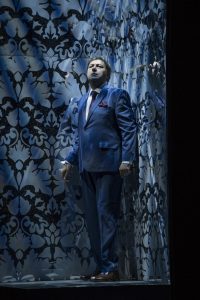 But Robert’s Burgundian friend Count Vaudémont (ardent tenor John Irvin) is free to love. His sudden and irresistible passion for Iolanta, coupled with her desire to literally see the light, will yield its own well-wrought miracle. As that happy ending transpires and transfigures, Tchaikovsky gives the chorus and principals a radiant anthem of consummate beauty and ravishing delight.
But Robert’s Burgundian friend Count Vaudémont (ardent tenor John Irvin) is free to love. His sudden and irresistible passion for Iolanta, coupled with her desire to literally see the light, will yield its own well-wrought miracle. As that happy ending transpires and transfigures, Tchaikovsky gives the chorus and principals a radiant anthem of consummate beauty and ravishing delight.
The magic of this scenario is that Iolanta cannot fall in love “at first sight” with Vaudémont — but, yes, first sound, touch, and kiss are extremely persuasive. Equally powerful, this knight’s devotion to his inamorata quite literally doesn’t need to be seen to be believed. Their mutual merit works overtime to earn the opera’s redemptive, rejoicing resolution.
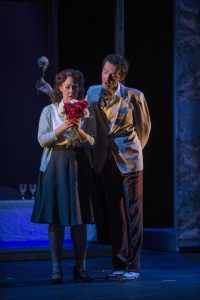 Along the way we’re treated to some very magic music: Iolanta’s ecstatic realization of the greater reality around her; Ibn-Hakia’s mystical description of the universe’s fusion of spirit and flesh; Robert’s hymn to his adored Matilda; the chorus’s paeans to spring and sightedness, and the achingly perfect duet that incarnates Iolanta and Vaudémont’s newborn romance.
Along the way we’re treated to some very magic music: Iolanta’s ecstatic realization of the greater reality around her; Ibn-Hakia’s mystical description of the universe’s fusion of spirit and flesh; Robert’s hymn to his adored Matilda; the chorus’s paeans to spring and sightedness, and the achingly perfect duet that incarnates Iolanta and Vaudémont’s newborn romance.
Just as he was about to lose it all and however much he doubted his genius, in 1892 Tchaikovsky was clearly at the height of his powers. His final gift to the world is a treasure to nurture and astonish. Chicago Opera Theater’s near-flawless staging honors that legacy in every note.
For a work that exalts the joys of light, the right look is essential: Alan E. Muraoka’s fluid set pieces get painted and repainted in filigreed Beaux Arts designs worthy of Robert Morris by lighting and projections designer Driscoll Otto: Iolanta’s amazement at the power of brightness and color could not be more rhapsodically conveyed. (The one misfire is the production’s choice of unexotic and leveling Depression-era costumes. Flattening the fantasies, the garb also undermines the medieval rankings in Tchaikovsky’s source.)
C.O.T.’s prize production splendidly confirms a great composer’s final bloom, as well as the non-negotiable talent of everyone on the Studebaker stage. What a marvelous achievement is this blast from the past!
Iolanta
Chicago Opera Theater
Studebaker Theater, 410 S. Michigan Ave.
ends on November 18, 2018
for tickets, call 312.704.8414 or visit COT
for more shows, visit Theatre in Chicago

